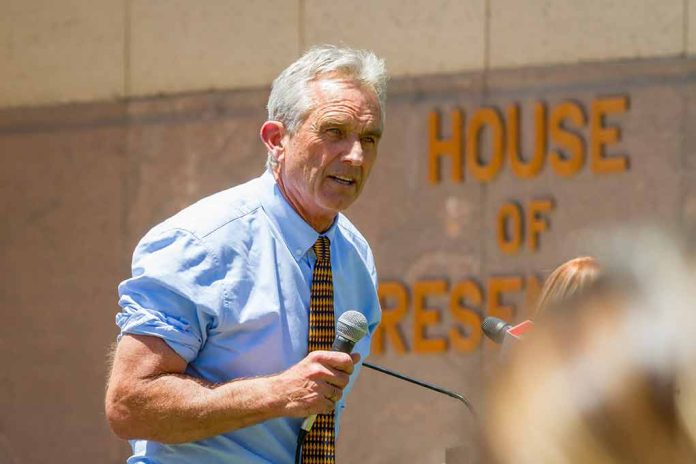
Robert F. Kennedy Jr. plans to reshape American healthcare and pursue legal action against COVID-19 vaccine developers after being appointed as Secretary of Health and Human Services under Trump’s administration.
At a Glance
- Kennedy reportedly selected as next HHS Secretary under Trump
- Plans to arrest Dr. Anthony Fauci and Bill Gates
- Intends to redirect NIH focus from infectious to chronic diseases
- Proposes legal action against Big Pharma for alleged harm to Americans
Kennedy’s Vision for Health Reform
Robert F. Kennedy Jr.’s potential appointment as Secretary of Health and Human Services under a second Trump administration has sparked discussions about significant changes in America’s healthcare landscape. Kennedy’s proposed reforms include a major shift in the National Institutes of Health’s (NIH) focus from infectious diseases to chronic conditions such as diabetes, obesity, and cancer.
This proposed redirection of the NIH’s efforts represents a substantial departure from current health priorities. Kennedy has suggested a temporary halt on infectious disease research, stating his intention to give this field “a break for about eight years.” This shift could have far-reaching implications for public health policy and research funding allocation.
Legal Action Against COVID-19 Vaccine Developers
In addition to healthcare reform, Kennedy has indicated plans to pursue legal action against individuals and organizations involved in the development and promotion of COVID-19 vaccines. This includes potential arrests of prominent figures such as Dr. Anthony Fauci and Bill Gates.
“Gates has been indicted in the Netherlands for lying to the public about the COVID-19 vaccine. And he’s going to have to go to trial” stated Kennedy
Kennedy’s comments suggest a broader strategy to hold pharmaceutical companies and their executives accountable for alleged harm caused to Americans. This approach aligns with ongoing debates about vaccine safety and pharmaceutical industry practices.
Implications for Public Health Policy
The potential implementation of Kennedy’s vision would mark a significant shift in U.S. public health policy. By redirecting focus from infectious diseases to chronic conditions, the proposal aims to address long-term health issues affecting a large portion of the American population.
However, this approach has raised concerns among some health experts about potential vulnerabilities in responding to future infectious disease outbreaks. The balance between addressing chronic health issues and maintaining readiness for infectious threats remains a topic of debate in the medical community.
Conclusion
Robert F. Kennedy Jr.’s proposed plans as potential Secretary of Health and Human Services under a second Trump administration present a bold reimagining of American healthcare priorities. From shifting research focus to pursuing legal action against vaccine developers, these proposals could significantly alter the landscape of public health in the United States. As discussions continue, the potential impacts on healthcare policy, research funding, and public health preparedness remain subjects of intense scrutiny and debate.
Sources:
RFK Jr. warns: Tony Fauci and Bill Gates will be ARRESTED under second Trump administration













